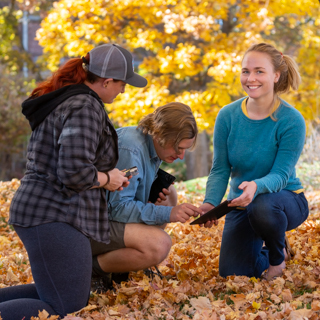Getting Started
Research allows you to pursue your interests, to learn something new, to hone your problem-solving skills and to challenge yourself in new ways. In this section, you’ll find information on getting started in research and creative scholarship.
Frequently Asked Questions
Research and creative scholarship are scholarly activities that center on inquiry and original contributions to a discipline, area, or theme. Research takes places across STEM, humanities, arts, business, education, and other fields. In general, research can be broken into two categories:
- Undergraduate research typically culminates in a poster or oral presentation and a comprehensive written report, essay or thesis.
- Creative scholarship results in a new work from your artistic vision or reinterpretation of existing work. This could be a dance, artwork, essay, or other creative piece.
If you are passionate about a topic, want to learn more about it, and are excited by the potential to make an original contribution, then you should consider research and creative scholarship! Research isn't’t something you need to wait to do in graduate school, and it does’t need to be done in a lab. If you’ve ever asked “why?” and looked for information, you’ve taken the first steps in research. You may also have some experience with the process of research or creating new creative scholarship from your personal life or education.
Every field of study has its own research problems and methods. As a researcher, you seek answers to questions of great interest to you. Your research problem could be aesthetic, social, political, scientific or technical. You choose the tools, gather and analyze the data, and report your findings to a wider audience.
Undergraduate research and creative scholarship help you develop useful transferable skills for any future career or academic trajectory, and provides an exciting, hands-on opportunity to put your coursework into practice. Some reasons to engage in research are to:
- Improve your critical thinking, problem-solving, and analytical skills
- Increase your resiliency and confidence
- Develop a mentoring relationship
- Explore your career, academic, and personal interests
- Build a community with peers
- Improve your professional communication skills
- Gain skills outside of coursework and apply learning to “real” situations
There is no right or wrong time to get involved – it depends on your interests and field of study. You might be ready to start doing research as a freshman, or you may need to build skills through coursework and start engaging later in your time at UM. There are many options for getting involved in research on campus if you are interested.
